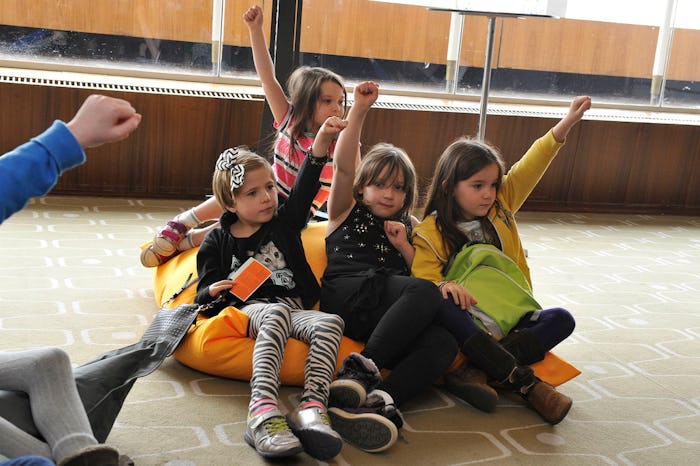When I was in high school, college, and right up until I decided I did want to have a baby, I knew "for sure" that I did not want to have a baby. I have always been a proud, outspoken feminist and, unfortunately, I thought that I couldn't be a mother and fight for women's rights simultaneously. I saw motherhood as nothing more than a forced social standard that women were pushed to meet, whether they actually wanted to be parents or not (which is still true), and I didn't want to bend to the wills of the patriarchy by getting knocked up and pushing another human being out of my body.
Now that I'm a mom, I realize how wrong (oh, so wrong) I was. I wasn't wrong about the pressure put on women to baby-up or opt-out of having their womanhood validated by society-at-large; that's very much the case, and it sucks. But I was decidedly incorrect in my thinking that procreating would fundamentally undermine my status as a feminist, that it would someone dilute the strength of my conviction. Having a kid can be hugely beneficial to feminists. Becoming a mother has made me even more aware of how important gender equality really is. After all, being a feminist doesn't mean that you do what you think you should in order to fulfill a certain role. No — being a feminist means that you fight for the equality of all genders, so that women have the freedom to make their own choices with their own bodies. I chose to have a child, and now I am choosing to raise that child to be a feminist as well.
Having kids, I've come to realize, is indeed a feminist act that highlights many of the things feminist fight for. Here are just a few reasons why popping out a mini-you isn't anti-feminist, but rather a great feminist choice that supports the continued work of the feminist movement.
You're Exercising Your Choice
A staple of the feminist movement is that women should be free to choose what they want to do with their bodies (and their lives in general) just like men are. When you become a mother, hopefully it was by choice. Women are (for now, with obscene restrictions and limitations) capable of terminating unwanted pregnancies, or using birth control to control reproduction, which means that motherhood has become (theoretically) a choice for women, instead of a foregone conclusion or an inevitable life milestone.
You Can Raise Future Feminists
As a mother, you can raise future feminists. You can teach a younger generation about gender equality and the need for women to be treated as equals in the home, at work, and everywhere in between. Not that any woman should feel obligated to surrender their bodies and energy in service to feminism as a movement (how anti-feminist would it be for anyone to expect you to turn into a mini-feminist soldier factory?), but if raising a kid is something you personally want, a nice benefit is that it doesn't mean all the new humans out there are being raised by non-feminists.
You Can Fight Against Gender Stereotypes
Mothers can help fight against gender stereotypes that work against the goal of feminism. Mothers can (and many do) have jobs, and some men stay at home and parent full-time, essentially trashing gender roles. A feminist mother can show her children that there is no need for the "man makes money, woman stays at home" paradigm to be the end-all-be-all.
You Can Diversify Feminism
Unfortunately, many people associate feminism with misandrists who don't want children, don't shave, and don't want men to be part of their lives. Obviously, this stereotype is far from the truth (although some women definitely are all of those things, and that's rad), and feminist mothers can help others realize that being a feminist doesn't (necessarily) mean you hate men and tradition, it just means that you believe the sexes to be equal.
You Can Help Stop The Marginalization Of Motherhood
Unfortunately, mothers have been made to feel excluded from the feminist movement. Starting in the '60s, feminist considered motherhood a form of slavery, and believed reproduction to be another way to control women. Therefore, women who became mothers were often looked at as a working cog of the patriarchy; weak women who were unable to "fight the power."
Whether that was true then, I can't say, but I can say that a woman's choice to become a mother doesn't make her weak or any less of a feminist. Mothers contribute to the feminist movement on a daily basis, and can help more and more people see the need for gender equality.
You Can Redefine What It Means To Be A Mother
For far too long, being a mother meant that you didn't work. You only cared about your children, you were married, and your husband "ran the house." That is (thankfully and obviously) not the case, and feminist mothers have an opportunity to redefine what it means to be a mother. Being a mother means that you make deadlines and playdates, run business meetings and birthday parties, settle cases and settle down a crying baby, handle high level meetings and handle a toddler tantrum. Mothers are more than just their ability (and choice) to reproduce, and it's time for that to become common knowledge.
Images: Southbank Centre/Flickr; Giphy (6)
